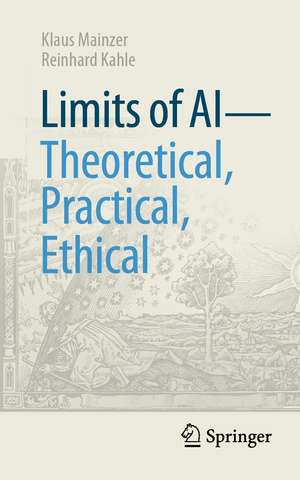Limits of AI - theoretical, practical, ethical : Technik im Fokus
Autor Klaus Mainzer, Reinhard Kahleen Limba Engleză Paperback – apr 2024
Din seria Technik im Fokus
-
 Preț: 203.42 lei
Preț: 203.42 lei -
 Preț: 151.13 lei
Preț: 151.13 lei -
 Preț: 155.49 lei
Preț: 155.49 lei -
 Preț: 87.78 lei
Preț: 87.78 lei -
 Preț: 180.99 lei
Preț: 180.99 lei -
 Preț: 126.77 lei
Preț: 126.77 lei -
 Preț: 127.82 lei
Preț: 127.82 lei - 20%
 Preț: 107.82 lei
Preț: 107.82 lei -
 Preț: 131.47 lei
Preț: 131.47 lei -
 Preț: 178.84 lei
Preț: 178.84 lei -
 Preț: 127.82 lei
Preț: 127.82 lei -
 Preț: 163.55 lei
Preț: 163.55 lei -
 Preț: 123.13 lei
Preț: 123.13 lei -
 Preț: 112.92 lei
Preț: 112.92 lei -
 Preț: 123.13 lei
Preț: 123.13 lei -
 Preț: 149.27 lei
Preț: 149.27 lei -
 Preț: 123.13 lei
Preț: 123.13 lei -
 Preț: 149.97 lei
Preț: 149.97 lei -
 Preț: 213.42 lei
Preț: 213.42 lei -
 Preț: 112.30 lei
Preț: 112.30 lei
Preț: 128.26 lei
Preț vechi: 160.32 lei
-20% Nou
Puncte Express: 192
Preț estimativ în valută:
24.55€ • 25.59$ • 20.40£
24.55€ • 25.59$ • 20.40£
Carte disponibilă
Livrare economică 28 februarie-14 martie
Preluare comenzi: 021 569.72.76
Specificații
ISBN-13: 9783662682890
ISBN-10: 3662682893
Pagini: 158
Ilustrații: XII, 158 p. 22 illus., 5 illus. in color.
Dimensiuni: 127 x 203 x 12 mm
Greutate: 0.18 kg
Ediția:2024
Editura: Springer Berlin, Heidelberg
Colecția Springer
Seria Technik im Fokus
Locul publicării:Berlin, Heidelberg, Germany
ISBN-10: 3662682893
Pagini: 158
Ilustrații: XII, 158 p. 22 illus., 5 illus. in color.
Dimensiuni: 127 x 203 x 12 mm
Greutate: 0.18 kg
Ediția:2024
Editura: Springer Berlin, Heidelberg
Colecția Springer
Seria Technik im Fokus
Locul publicării:Berlin, Heidelberg, Germany
Cuprins
The Concept of Artificial Intelligence.- Practical limits.- Theoretical limits.- Conceptual boundaries.- Prospects for Hybrid AI.- Bibliography.
Notă biografică
About the Authors
Klaus Mainzer teaches as Emeritus of Excellence at the Technical University of Munich and as Senior Professor at the Carl Friedrich von Weizsäcker Center at the University of Tübingen. He is President of the European Academy of Sciences and Arts. His research focuses on complexity and computability theory, foundations of artificial intelligence, philosophy of science and technology, future issues of the technical-scientific world.
Reinhard Kahle is Carl Friedrich von Weizsäcker Endowed Professor of Theory and History of Science at the University of Tübingen. His research interests include proof theory and the history and philosophy of modern mathematical logic, foundations of computer science and the philosophical reflection of science as currently propagated in artificial intelligence.
Textul de pe ultima copertă
Artificial intelligence is a key technology with great expectations in science, industry, and everyday life. This book discusses both the perspectives and the limitations of this technology. This concerns the practical, theoretical, and conceptual challenges that AI has to face. In an early phase of symbolic AI, AI focused on formal programs (e.g., expert systems), in which rule-based knowledge was processed with the help of symbolic logic. Today, AI is dominated by statistics-based machine learning methods and Big Data. While this sub-symbolic AI is extremely successful (e.g., chatbots like ChatGPT), it is often not transparent. The book argues for explainable and reliable AI, in which the logical and mathematical foundations of AI-algorithms become understandable and verifiable.
About the Authors
Klaus Mainzer teaches as Emeritus of Excellence at the Technical University of Munich and as Senior Professor at the Carl Friedrich von Weizsäcker Center at the University of Tübingen. He is President of the European Academy of Sciences and Arts. His research focuses on complexity and computability theory, foundations of artificial intelligence, philosophy of science and technology, future issues of the technical-scientific world.
Reinhard Kahle is Carl Friedrich von Weizsäcker Endowed Professor of Theory and History of Science at the University of Tübingen. His research interests include proof theory and the history and philosophy of modern mathematical logic, foundations of computer science and the philosophical reflection of science as currently propagated in artificial intelligence.
Caracteristici
Generally understandable introduction to artificial intelligence Provides an outlook on future technologies Explains clearly the limits of AI
